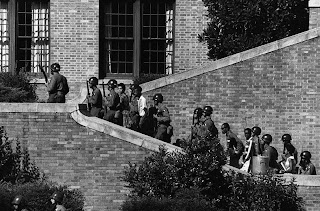View Little Rock Central High School Visitor Center in a larger map
Visit our Tour Destination:
 |
| Little Rock Central High School. Photo courtesy Little Rock Central High School National Historic Site. |
The Treasure: Little Rock Central High School
Accessibility: The Little Rock Central High School Visitor Center
Background: On
September 23, 1957, nine teenagers went to school… and the United States
 |
| Students escorted into Central High School by 101st Airborne Division on September 25, 1957. Source: Wikimedia Commons |
Police protected the Little Rock Nine as they entered Central High School
On a national level, the events of this period demonstrated
the federal commitment to enforcing equal civil rights for all U.S. Little Rock Central High School
The showdown between Eisenhower and Faubus continued to
simmer over the next two years, creating enormous stress at the school under the glare of international media attention. Three of the Little Rock Nine students completed their high school studies at Central High School, with Ernest Green becoming the first African-American student to graduate from Central High School
The Little Rock Nine were: Ernest Green, Elizabeth Eckford, Jefferson
Thomas, Terrence Roberts, Carlotta
Walls, Minnijean Brown, Gloria
Ray, Thelma Mothershed,
and Melba Pattillo.
Notes from the
Editor: Central High School
 |
| Preserved Mobil Station where reporters would gather during the events of the late 1950s. Photo courtesy of Little Rock Central High School National Historic Site. |
For visitors, everything can be found at the intersection of
Daisy Bates Drive South Park Street Visitor
Center
At the Central High School Visitor Center, you can
experience multimedia exhibits and see a film on the historic events at Central High School Daisy
Bates Drive
There is a Central High Commemorative
Garden across Park Street Visitor Center
Other Recommended
Sites: Arkansas Central
High School Buffalo National River ,
Clinton Birthplace National Historic Site, Fort Smith National Historic Site, Hot Springs National Park ,
and Pea Ridge National Military Park .
There are 52 Arkansas State Parks where visitors can explore the
natural beauty of Arkansas
Tour America's History Itinerary
Wednesday’s destination: Eureka Springs City Auditorium
Friday’s destination: Camp Ouachita
Friday’s destination: Camp Ouachita
© 2012 Lee Price


No comments:
Post a Comment